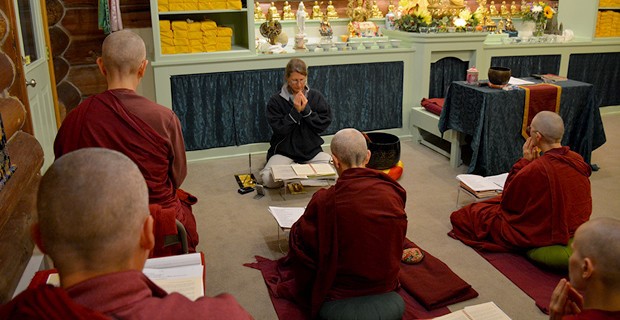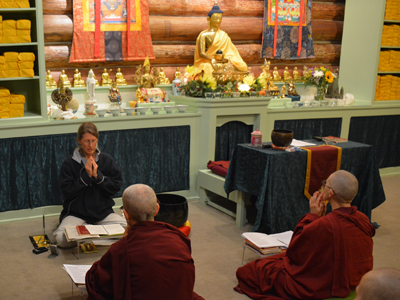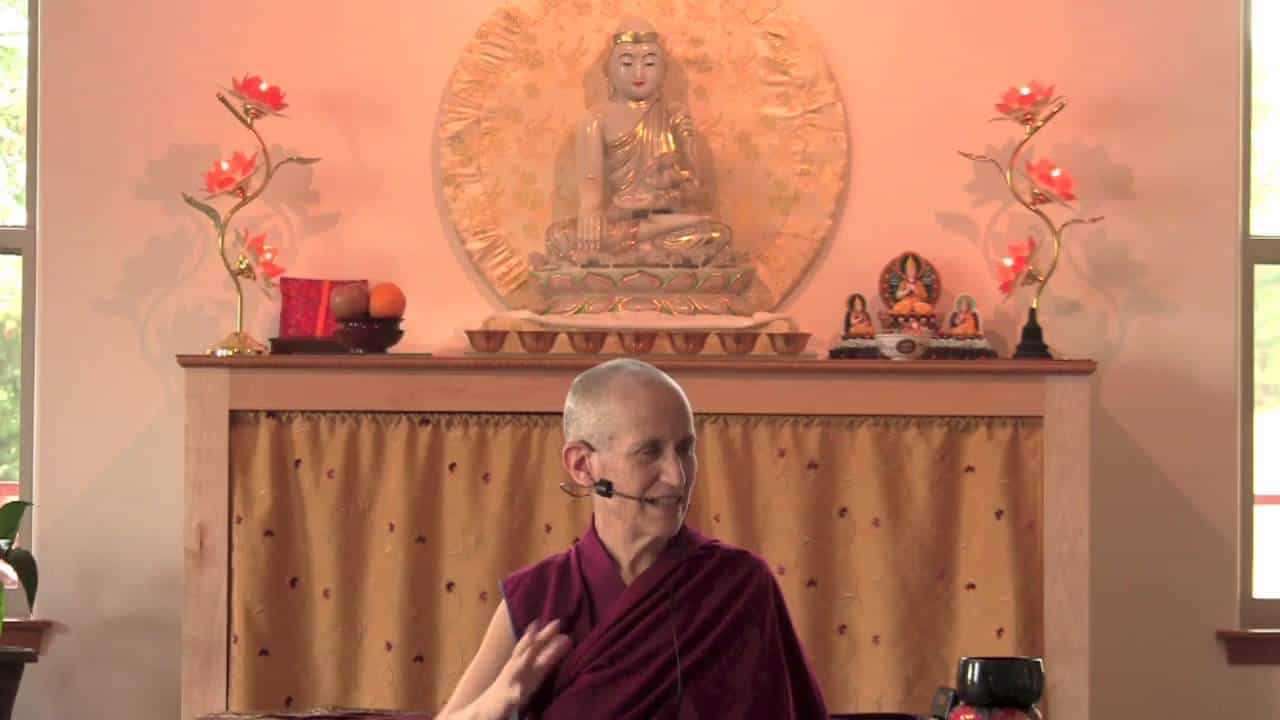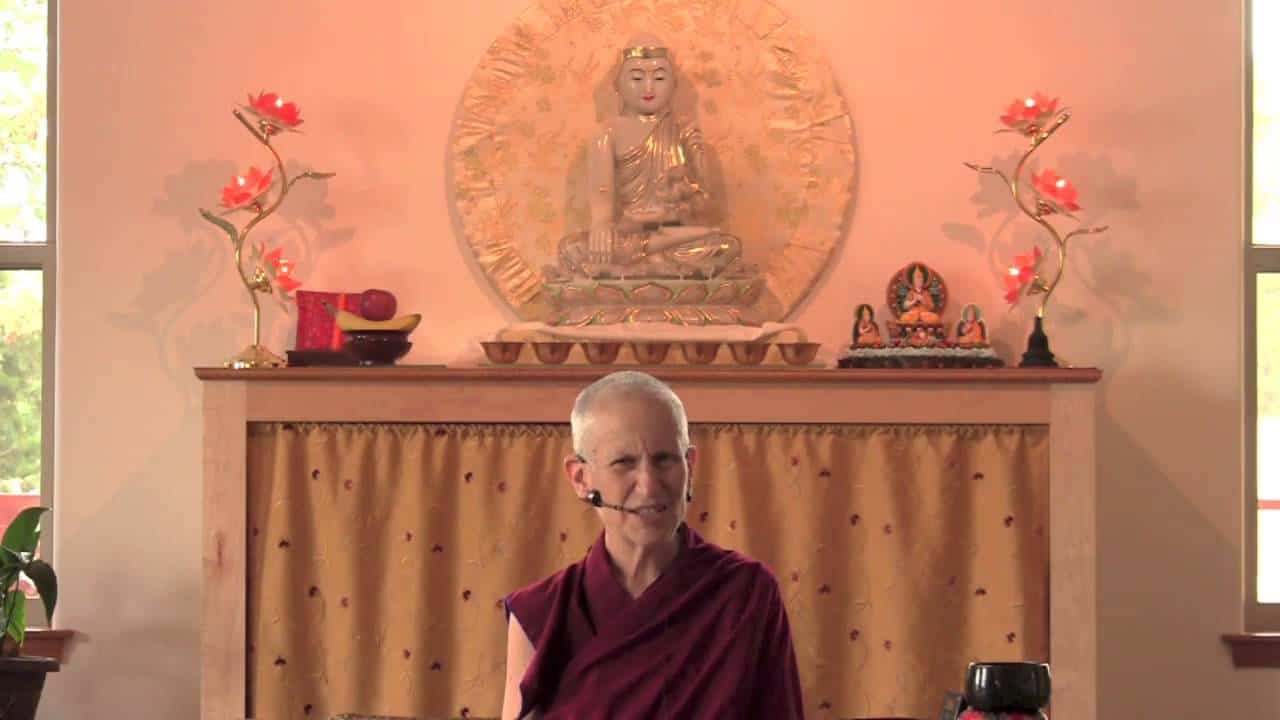The Vajrasattva ngondro

After Heather participated in the 2014 Vajrasattva Retreat at Sravasti Abbey, she wrote about her experience here. After continuing the practice and completing the ngondro of 111,111 long mantras, she offers her thoughts on the practice and how it has affected her life.
I just completed the Vajrasattva ngondro—the preliminary practice of meditating on Vajrasattva and reciting 111,111 long mantras. My experience with the Vajrasattva ngondro has been all over the map. There were lots of times that I struggled with it; not connecting in the same way I did with the 35 Buddhas ngondro.
Then there were times that I was almost inseparable from the practice, going to sleep reciting mantra, waking up reciting mantra; whatever it took to turn my mind again and again, because the awareness of suffering was so acute that I had absolutely no focus otherwise. It was as if my life depended on it.

The deeper I understood my situation in samsara, the easier it was to practice. (Photo by Traci Thrasher)
Those days were, strangely enough, great blessings. A steady assault of afflictions didn’t allow me the luxury of complaisance and I found I was able to use the experience to push me deeper into refuge and purification. As you’d expect, the deeper I understood my situation in samsara, the easier it was to practice.
I spent a lot of time contemplating purification, what it is and why it works. From what I understand from the teachings, the “having happened” (zhigpa) of my unskillful actions exist and are a cause for future suffering, until, that is, the conditions no longer exist for that suffering to ripen. In other words, until I realize emptiness, I can’t actually eliminate the “seeds” that I create in each moment. It happened and I can’t make it unhappen. What I can do though is:
- not give it the conditions to ripen until I am able to get at the root, and
- overwhelm the propensity with its counterforce so that it’s very unlikely to arise.
Purification is saying, “this action results in suffering and I’m just not going to do it anymore,” and then directing my mind in the opposite direction, creating an energy, a counterforce. So as I recite Vajrasattva mantra again and again, I’m creating this counterforce, this new habitual pattern towards virtue, this determination to refrain from negative action. Recitation after recitation, the energy slowly builds into a momentum that can act as the conditions for virtue in the next moment and the next moment … . That momentum, I’m thinking, is what minimizes or impedes the ripening of negative karma. It just can’t ripen in the same way if my mind is perpetually directed towards virtue, the conditions just aren’t there for certain results to manifest.
Contemplating purification also drove me to a deeper understanding of karma. I think good ethical conduct, when it comes down to it, is really about being able to bear my own afflictions and karma. Purification helps me to do that by directing my mind in a beneficial direction: setting my intention on virtue. Refraining from harm is recognizing that those ants in the kitchen are my ants, it’s my angry husband, it’s my sick dog, it’s my depressed neighbor, it’s my county where someone sits quietly in a bible study and then just starts shooting, it’s my world with poverty and racial injustice. These are the results of my karma and part of the path is recognizing and learning how to bear those results without creating more of the same. And one step further, using those results to create inconceivable virtue by generating bodhicitta.
This takes an incredible amount of fortitude and perhaps that’s what I learned most deeply through this ngondro. Fortitude really speaks to me. I feel like this is an enormous part of my path: the ability to bear my experience without reacting unskillfully, knowing that it is my OWN karma ripening, and instead using that experience to create great virtue. I’m sure I’ll spend lifetimes just on this.
I have so far yet to go, but it seems like a good time to acknowledge that I never in a million years would have come this far without my teacher and the Abbey. THANK YOU so much for your many, many kindnesses—your teachings, patience, encouragement, emails, letting me come to the Abbey to learn and practice alongside you. It is making an incredible difference in my life, my practice, and my capacity to benefit others.
Heather Mack Duchscher
Heather Mack Duchscher has been studying Buddhism since 2007. She first started following Venerable Chodron's teachings in January 2012 and began attending retreats at Sravasti Abbey in 2013.


